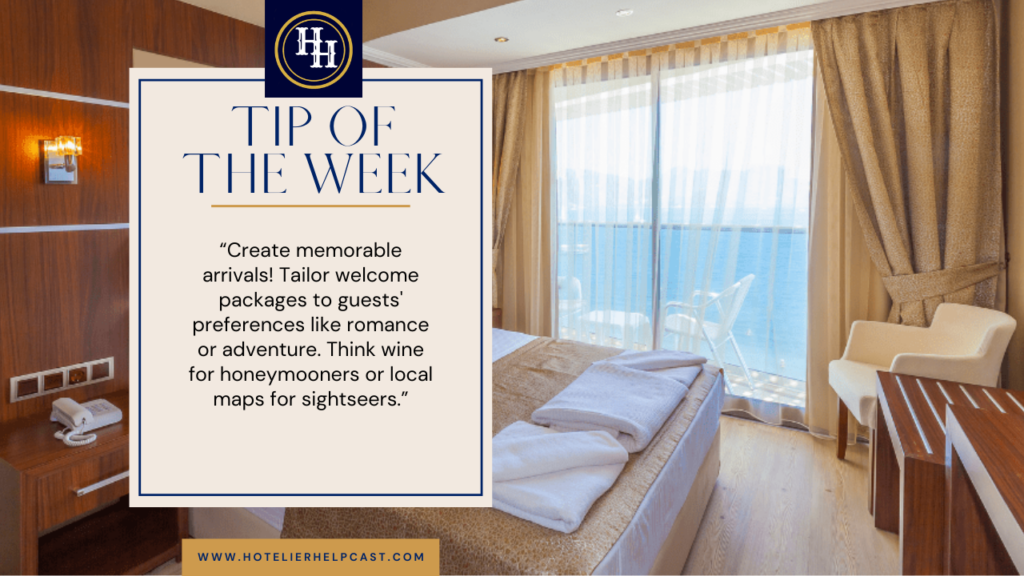-
Discover how switching to active voice in your hotel's communications can transform guest interactions and boost satisfaction ratings.
- Transform Your Hotel Business Dynamic Communication-033
- How Can Mastering Grammar Enhance Your Hotel Professionalism?-032
- How To Unlock Better Guest Experiences With Active Voice-031
Discover how switching to active voice in your hotel’s communications can transform guest interactions and boost satisfaction ratings.
Clear and engaging communication is a keystone of guest satisfaction. How hotels interact with guests can significantly influence their overall experience and perception of the brand.
.
Let’s look into the benefits of using active voice in guest correspondence, highlighting its relevance and importance in enhancing communication strategies at your property. You will gain insights into practical applications to foster a more personal and proactive interaction with guests, ultimately contributing to increased guest loyalty and positive reviews.
Understanding the Role of Active Voice in Communication
Active voice in writing is direct and dynamic, making statements clearer and more engaging for the reader. For hotel managers and staff, utilizing active voice in guest correspondence can transform the tone of communication, making it appear more personal and attentive. Let’s look at why active voice is effective and how it positively affects guest perceptions. For instance, consider the difference between “Your booking has been confirmed” (passive) and “We have confirmed your booking” (active). The active voice not only clarifies who is acting but also creates a feeling of engagement and personal service.
.
.
Benefits of Active Voice in Guest Correspondence
Using active voice in guest communications has several key advantages:
- Clarity and Precision: Messages are straightforward and less prone to misinterpretation.
.
- Engagement and Responsiveness: It fosters a sense of conversation and attentiveness, making guests feel valued.
.
- Proactive Atmosphere: It portrays the hotel as proactive and enthusiastic about guest interactions.
.
An example of an active voice in action could be during a service recovery situation. “We are addressing your concern immediately” is more reassuring than “Your concern is being addressed,” emphasizing the hotel’s commitment to resolving issues swiftly.
.
.
Strategies to Implement Active Voice in Your Hotel’s Emails and Texts
Transitioning to active voice involves more than just sentence restructuring. It requires a mindset shift towards proactive customer service. It means integrating active voice into various forms of guest correspondence, including booking confirmations, pre-arrival emails, and service feedback requests. Training sessions for staff can be incredibly beneficial, focusing on examples and role-play scenarios to highlight the effectiveness of active voice in real-life interactions.
.
.
Impact of Active Voice on Guest Satisfaction and Loyalty
How does a simple shift in grammar influence guest loyalty?
.
Switching from passive to active voice in hotel communications can significantly improve guest satisfaction and return rates by making messages clearer, more direct, and more engaging.

Let’s look at OceanView Resort, a medium-sized hotel located by a popular coastal destination.
.
They noticed stagnating guest satisfaction scores and a dip in return guest rates. Feedback indicated that their communication style might be contributing to the issue.
.
The hotel decided to revise its communication strategy by training its staff and updating its written materials to use active voice. The changes included:
Email Communication:
- Before: “Your reservation has been confirmed by our team.”
- After: “Our team has confirmed your reservation.”
Promotional Materials:
- Before: “Special offers are provided throughout the year.”
- After: “We provide special offers throughout the year.”
Feedback Requests:
- Before: “Feedback is requested at the end of your stay.”
- After: “Please share your feedback at the end of your stay.”
.
Service Descriptions:
- Before: “Room service is offered 24/7.”
- After: “We offer room service 24/7.”
Over three months, all staff were trained in the use of active voice for verbal and written communications. The hotel’s marketing materials, guest correspondence, and internal communications were revised to reflect this change.
.
Results:
- Within six months of implementing the change, guest satisfaction surveys showed a 10% improvement in scores related to clarity and helpfulness of communication.
- The clarity and directness of the active voice also had a positive impact on return rates, which increased by 8% in the year following the change. Guests commented on how personable and engaging the communication had become, making them feel more connected to the hotel.
- Employees reported that the active voice-enabled them to engage more effectively with guests, leading to more dynamic interactions and an overall improvement in service delivery.
The shift from passive to active voice in OceanView Resort’s communications made the hotel seem more welcoming and attentive, directly contributing to improved guest experiences and higher return rates.
.
.
Overcoming Challenges in Shifting to Active Voice
Shifting from passive to active voice in hotel communications can be challenging. Here are some common challenges hotels face when making this shift and strategies they’ve used to overcome them:
Challenges
Staff Training and Adaptation:
- Issue: Staff, particularly those who have been with the hotel for a long time, and who are used to the ways things have been, might not want to change. Changing this habit requires not only retraining but also a shift in mindset.
- Solution: Conduct comprehensive training sessions that emphasize the benefits of active voice. These include role-playing scenarios and before-and-after text transformations to highlight the impact of active versus passive voice.
Consistency Across All Communications:
- Issue: Ensuring that all forms of communication (emails, brochures, website content, verbal interactions) consistently use active voice can be challenging, especially for larger hotels with multiple departments.
- Solution: Appoint communication champions within each department. These individuals are responsible for monitoring and ensuring that the active voice is used consistently. Additionally, using templates and guidelines for common communications can help maintain consistency.
.
Cultural and Language Differences:
- Issue: In multicultural settings, some staff members may find active voice less natural than passive voice, particularly if their first language structures sentences differently.
- Solution: Tailored language training that respects cultural differences while promoting the benefits of active voice can be effective. Also, providing multilingual examples can help illustrate how active voice works in various languages.
Measuring Impact:
- Issue: It can be difficult to directly measure how changes in voice affect guest satisfaction and return rates.
- Solution: Hotels have addressed this by using specific metrics in guest satisfaction surveys that ask about the clarity and effectiveness of communication. This data is then analysed to see if improvements correlate with the use of active voice.
Updating Existing Materials:
- Issue: Revising existing marketing materials, contracts, and digital content to reflect a new style of communication can be time-consuming and costly.
- Solution: Phase in the changes, starting with the most guest-facing materials such as emails and promotional content, and gradually updating less critical documents as needed. This phased approach reduces the immediate burden and spreads out the cost.
 Are you ready to take your hotel business to new heights? Get your hands on our comprehensive guide, ‘Unlocking Hospitality Success: 25 Must-Know Insights for Independent Hotel Owners’. It’s packed with the wisdom you need to stand out in the crowded hospitality market. Think of it as your secret weapon to outshine the competition. Download your free copy now – just follow the link in the show notes!
Are you ready to take your hotel business to new heights? Get your hands on our comprehensive guide, ‘Unlocking Hospitality Success: 25 Must-Know Insights for Independent Hotel Owners’. It’s packed with the wisdom you need to stand out in the crowded hospitality market. Think of it as your secret weapon to outshine the competition. Download your free copy now – just follow the link in the show notes!
What challenges have you faced in updating communication strategies within your hotel?
Share your experiences in the comments below!
In Conclusion
Embracing an active voice in guest correspondence is not just a stylistic choice—it’s a strategic business decision that enhances clarity, engagement, and responsiveness in communication. Hotels that successfully implement this approach can expect not only to improve guest satisfaction but also to foster greater loyalty and advocacy among their guests. By focusing on clear, direct, and engaging interactions, hotels can significantly enhance their operational effectiveness and guest relations.
.
In the next episode, I will talk about …
.
We encourage hotel owners and operators to review their guest correspondence and consider the integration of active voice. Share this article with your network to help spread the importance of effective communication in the hospitality industry. How will you update your communication strategy today?
⇒ TO READ OR LISTEN TO THIS EPISODE ON KEYSTONE HOSPITALITY PROPERTY DEVELOPMENT
https://hotelierhelpcast.com/2024/05/how-to-unlock-better-guest-experiences-with-active-voice-031
.
Serious about taking your business to the next level? Sign up for the “Check-In to Success-Building and Running Your Hotel Business” course
.
Grab your copy of the “Unlocking Hospitality Success: 25 Must-Know Insights for Independent Hotel Owners” PDF
hotelierhelpcast.com/success-25-must-know-insights-for-independent-hotel-owners-download
.
Join our groups
.
Listen to The Hospitality Property School PODCAST here
.
YouTube Channel
Gerry MacPherson
Say hi on social…
A Division of Keystone Hospitality Property Development
The Psychology of the Hotel Repeat Guests: What Really Brings Them Back?-110
Are You Working On Your Hotel Business or Just In It?-109
How to Spot Hotel Burnout Before It Wrecks Your Property-108
- 1
- 2
- 3
- 4
- …
- 37
- Go to the next page





